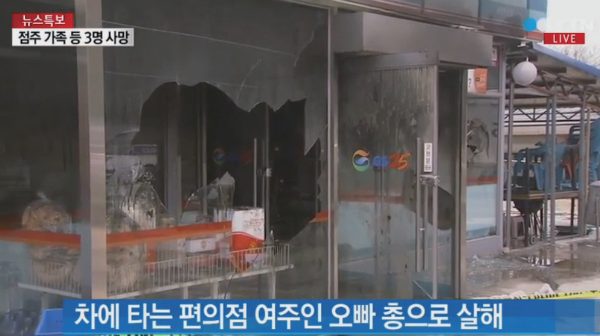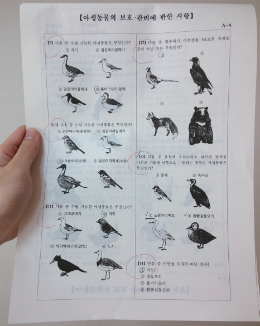As the worst shooting spree in modern American history occurred in Las Vegas on October 1st, 2017, the wave of mourning has been continuing around the world. Consequently, there are voices that regulations on the possession of guns should be strengthened in America and other parts of the world, including Korea. Lee Jae-jeong, a member of the Public Administration and Security Committee, said that it is necessary to find a solution for the present regulations of gun possession which cause instances of inadequate gun management. Such opinions are especially becoming more persuasive, as the country is hosting the Pyeongchang 2018 Olympic Winter Games next February. In this regard, the Sungkyun Times (SKT) now explains laws related to licenses for gun possession and presents situations around the issue and the loopholes of the laws and their enforcement, and suggests how to improve the laws.
Regulations for the Possession and Use of Guns in Korea
Act on the Safety Management of Firearms
In Korea, regulations for the possession and use of guns are outlined in the Act on the Safety Management of Firearms, which is included in Act on the Safety Management of Firearms, Knives, Swords, Explosives, etc. They are based on the Enforcement Decree of the Control of Firearms, Swords, Explosives, etc., which was enacted in 1961. The purpose of this law is to contribute to the maintenance of public safety by preventing any danger or accidents likely to be caused by guns. It includes regulations for the manufacture, sale, lease, transportation, possession, and use and safety management of guns.
Main Contents of the Law
According to the Act, nobody can possess a gun without permission, except those who are professionally required to possess guns, such as those in the field of manufacturing or selling guns. Civilians are allowed to carry guns only when they get permission. Depending on the type of guns, they should obtain permission from the Commissioner General of the National Police Agency or the commissioner of their local police agency. Some people, however, are not allowed to have guns; those who are under 20, those with mental disabilities, those who have a criminal record or those who once had permission to possess guns but had their permission canceled within the past year. People who want to get permission for a license must complete an education course that teaches the related laws and how to properly use, store, and handle a gun. The license needs to be renewed every three years to hold its legal validity.
Basically, possession and transportation of guns are prohibited except for authorized or justifiable uses and reasons. In addition, even if a person has the eligible permission to use guns, guns and their bullets should be placed in specific places that the police designate for their storage when not being used. In specific periods, such as during hunting season when the government allows people to hunt freely, however, people can carry their guns and bullets freely regardless of time and place.
<Permission Process for Possessing Guns>
There are five types of documents that need to be submitted: physical examination document, certificate for origin of guns, certificate for use of guns, photographs and a medical history report, and a consent form for the collection and use of personal information. Among these, the certificate for origin of guns includes the following items:
① Shooting player certificate (shooting gun for their job)
② Class 1 hunting license or hunting license test certificate (hunting gun)
③ license for poaching vermin (vermin-poaching gun)
④ documents that can prove the purpose of using guns (any other guns)
It takes seven days to get permission from the Commissioner General of the National Police Agency, and 10 days from the commissioner of a local police agency.
Present Conditions Around Gun Possession and Law Enforcement Loopholes
Present Conditions Around Gun Possession
Although it has been revised several times to deal with its loopholes, the Act on the Safety Management of Firearms is still not very effective. According to the Korean National Police Agency (KNPA), the number of domestic guns with legal permission was 143,643 in Korea in 2015. Furthermore, the number of guns that can be carried freely anywhere at anytime by the individual was 86,919, exceeding half of the whole number of domestic guns. This huge figure is a major cause of gun crimes, thus making it impossible to achieve the goal of the law and threatening public safety. In fact, KNPA announced that there have been 64 cases of gun crimes in the past five years. In particular, there were 18 gun crimes last year, which has increased from 11 cases in 2011. According to statistics from the Supreme Prosecutors’ Office (SPO), 46% of criminals of gun crimes had already possessed their guns before committing the crimes.

It is desirable that the government implements thorough management processes on licensing gun possession. As gun-related crimes such as recent murder cases in Hwasung and Sejong City continue to occur, the anxiety of the nation is increasing. To protect people from gun crimes, therefore, it is necessary to tighten the regulation for guns, as just one gun crime can trigger unrecoverable damage and risks that threaten public safety considerably.
Loopholes of the Law Enforcement

•Ease of the Gun License Process
Korea has a relatively easier process to get a license for guns compared to that of other countries. In other words, anyone who wants to get guns for crimes can easily obtain a license. This is because the licensing process works just as a formal process. The government requires information about those seeking permission to be written on formal documents. For instance, it only requires physical examination documents from any hospital to describe the individual’s condition. Particularly, mental diseases are not serious obstacles if there are no diagnostic records about them.
The fact that people can easily obtain certificates for the use of guns is also a serious problem. Hunting licenses, for example, are one of the certificates which people can easily acquire. By passing a simple writing test and physical examination, they can get the certificate. In the case of farmers, they can get the license more easily. If one has the proper documents including farmland registers, obtaining a license for poaching vermin is less time-consuming and simpler than getting a hunting license.
Furthermore, it is also a problem that gun stores usually do the process on behalf of their clients. In these cases, clients get licenses under the name of the owners and his or her family members’ names, not their own names. An owner of a gun store in Incheon admitted that people can easily get permission for gun possession if they just follow his instructions.
•Poor Management Systems for Licensed Guns
Not only is the possession process flawed, but the management systems for licensed guns have their own problems. One of the biggest problems is carrying licensed guns for hunting purposes. Hunting is only possible in certain areas, but it is possible to commit crimes since people can keep and carry their guns in any police station. This increases risks of abusing guns for crimes. Last year, for example, a 46-year-old woman shot a person who was a member of her climbing club. The gun used was originally licensed for hunting purposes. Due to the shot, the victim suffered serious injuries that required treatment for 112 days.
In addition, there is not enough data dealing with licensed guns, which causes confusion in the management process. According to the Board of Audit and Inspection of Korea, data on 2,378 of 101,607 people who have licenses, such as resident registration numbers and names, were written incorrectly in the management system. Even 42 ex-convicts were permitted to have guns. Furthermore, there are often cases of guns disappearing which were kept in police stations for safety. An air rifle which was being kept by police 20 years ago, for instance, disappeared and has not been found since then. Even in these poor situations, it is not easy to manage guns because of an insufficient police workforce. According to KNPA, 523 guns are managed by a single police officer on average. There are only one or two officers who manage guns at each police substation and patrol division, which makes it difficult to manage the licensed guns properly.
Ways to Improve the Act on the Safety Management of Firearms
It is not possible to prevent gun crimes without solving the mentioned loopholes. To improve their laws, Japan, which is a country that has similar gun possession laws as Korea, can be a role-model to learn from. Japan has a low crime rate and had only six gun-related crimes occur in 2014.
Strengthening Requirements for Possession of Firearms
The licensing process for gun possession must be more detailed and classified for thorough management. First of all, it should be mandatory to diagnose the mental health of applicants wanting a license. This diagnosis should be directly implemented by the police, who can yield more credible results by finding mental diseases or drug addictions that have never been written on any diagnosis records. It is also desirable to tighten up the identification process for preventing the abuse of guns in advance. Moreover, the police must closely examine the applicants’ personal lives like social relationships. Japan, for instance, even checks the possibility of applicants having relationships with gangs.
Furthermore, adding regular writing and performance tests can be a positive solution. This can not only prevent a third party like gun stores from conducting the license process on behalf of the applicants, but can also be effective in determining the competence and eligibility of the applicants regularly. For example, those wanting or having the license should pass the test after an all-day education course, which is required to be updated every three years.
Upgrading the Gun Storage System
In Korea, licensed guns can be stored by their owner or should be stored by the police, depending on their types. In the case of the former, there is a high risk of losing a gun. In order to prevent this problem, it is necessary for those with licenses to submit documents whose contents include where their guns and bullets are stored. In fact, Japan makes it mandatory to specify where licensed guns are stored.
In addition, it should be required to have detailed data for all licensed guns. To prevent the risk of loss, the existing licensed guns should be checked regularly, at least once a month. It is also a good idea to check on the background information of those who have licenses in order to find errors, hopefully preventing situations of unqualified people such as ex-convicts from getting a license. Along with this, building networks with local police stations can make the law more effective by using Global Positioning System (GPS) attachments on guns. Of course, an increase in manpower and budgets is also needed.
If a crackdown on illegal guns is done more thoroughly, Korea will be able to prevent some gun crimes in advance. Choi Eueng-ryeol, a Professor of Police Administration at Dongguk University, said that people should continue to pay attention and provide solutions for gun problems, rather than coping with them only after the accidents have already happened. As he said, the Korean government must arrange long-term improvements for the law and its enforcement.
